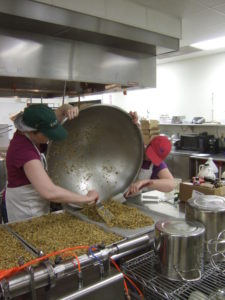Diversified Portfolio: Not Just for Wall Street
Open any financial advice magazine over the past decade and the single most popular advice given will be to make sure you maintain a diversified portfolio; basically, spread your money over many different funds and investment vehicles. They even have widgets which will rebalance your accounts and suggest different investments based on your particular goals such as education, retirement, or home ownership. The same sage advice with a slightly different twist can be given to any small farmer. Unless you are a mega-industrial farmer, relying on one crop is not a good recipe for long term success.
Long term success is something the Courser Farm in Warner, NH knows a little bit about. The Courser family has been managing over 1,500 acres of farmland for 100 years. The family farm has survived two world wars, the Great Depression and the great recession in addition to the constantly changing American diet. Originally focusing on timber and corn, the family has expanded its offerings along the way. They’ve added pumpkins, maple syrup and hay to the list. Timber is sold to saw mills while corn continues to be a road side stand crowd attractor. Maple syrup has its peak in March while pumpkins round out the year in the fall.
Creating an array of products which not only target different audiences, but also different times of the year creates a healthier portfolio to maintain a continual revenue stream. Putting all of your eggs in one basket (pun intended) can create make-it or break-it financial moments. Diversifying your product sales channels will also make a big difference. For example, the Coursers leverage their pumpkins as an entertainment venue by inviting carvers to a weekend jack-o-lantern festival. Their maple syrup gets visitors out to their sugar shack during NH maple weekends. The timber sales allow them to tap into the commercial market. This healthy diverse balance provides a more stable enterprise.
However, like any long term family farm, the Coursers understand they must change with the times and be open to emerging trends. They don’t have one of those financial balancing and suggestion widgets, but they do have four generations of working experience. Emma Courser Bates is a member of that fourth generation forging into new territories. Emma is the founder of Courser Farm Kitchen, a gluten free bakery.
After several of her family members were diagnosed with Celiac disease (caused by adverse reaction to gluten), she started cooking up gluten free baked goods. It wasn’t long before she realized there was an entire group of people the farm was not currently catering to. The Kitchen quickly started up and she was staking out a stand at farmers markets across the region. “Many buyers who were not gluten intolerant were reluctant to buy gluten free baked goods,” Emma noted, so she expanded once more into a long time favorite of hers, home-made granola.

Emma and her cooking assistant, Emily, cooking a batch of Maple Nut granola. Photo by Mason Donovan.
“Granola allowed me to reach a wider audience,” she said. When asked to define her target audience Emma said she was working on getting a more narrow definition. Celiac affects twice as many females than males, so she concedes the gluten free aspect is probably more luring to women. However, granola has given her access to both the gluten-free and the mainstream crowd.
Courser Farm Kitchen has also given the Courser family their first step into the online world. Although, the majority of buyers are currently local, there is a growing clientele of out-of-state buyers. Best of all, granola is a year round product. Business has picked up enough for Emma to move her operations to a nearby commercial kitchen where she will spend ten hours mixing, baking and packaging seven different flavors of granola. One of her flavors, Maple Nut, also allows this product extension to draw upon one of the popular farm products, maple syrup.
Knowing when to divest is just as important as when to invest as well. One of the flavors which went to the graveyard was Peanut Butter Banana because of all of the peanut allergies. New flavors take into concern other allergies such as sulfate, so some mixes have no dried fruit.
The Courser Farm Kitchen concept has sparked conversation as to where the farm family business will be when the fifth generation is old enough to climb onto the tractor. Their overarching strategy is as sound as any financial manager could give. They maintain an inclusive approach which has allowed them to reach a much wider group of buyers. Their focus on diversifying their portfolio of products and sales channels provides a return in every season. After all diversity and inclusion is not just something reserved for Wall Street.


Emma, the owner of Courser Farms is hosting a giveaway contest to giveaway 8 bags of her gourmet granola! Please show your support by spreading the word about winning her gourmet granola and it’s so easy to enter this contest!
Contest is 8/22/2013-8/30/2013
http://www.americanmomreview.com/2013/08/enter-courser-farm-kitchen-granola.html
Thank you and good luck!
Courser Farms journey is a testament to the power of diversification not just in finance but also in agriculture. Emma gluten free venture especially the granola line illustrates how staying attuned to market needs ensures sustained success.
Sacramento Locksmiths for Car Unlocking